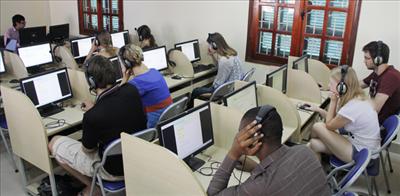

Prof.Dr Vu Duc Nghieu (Photo: Thanh Long USSH)
Dear professor, what are the reasons behind the decision of USSH (Hanoi National University) to develop the Standardized System of Criteria for Vietnamese proficiency of foreign students and tests to evaluate Vietnamese proficiency of foreign students?
Prof.Dr Vu Duc Nghieu: In fact our desire to build a standardized system and tests to evaluate Vietnamese proficiency of foreign students is no longer a new story. It is because the teaching of languages worldwide has been increasingly developing; the methods and measures for testing, evaluating and defining one’s foreign language capacity have been growing and changing swiftly. For our part, it is necessary to make proper and timely improvements to catch up with worldwide advances in this area.
USSH has a long tradition of teaching Vietnamese, I mean, since the time of Hanoi General University, the number of students learning Vietnamese as a foreign language both within and without Vietnam and at the university has risen up, making it essential and compulsory to establish a structure of criteria to evaluate and define the Vietnamese capacity of students.
Moreover, our conventional way to evaluate students’ capacity was to generate tests based on their respective level of proficiency, to see if they meet that level; but the new system is based on a set of 10 principles and 51 criteria and each test is a “set” of questions with standards ranging from basic level to skilled level (based on the 6–level European scale); candidates will be able to freely present their skills; and finally the automatic scoring will tell candidates of their scores levels.
In organizational and procedural aspects, the assistance of information technology undoubtedly makes testing more convenient in various ways, from personnel organization to marking and scoring. Our ultimate goal is to ensure that anyone is able to register and do the tests whenever and wherever he wants, as long as he has a computer connected to the Internet.
- Are the contents formed and integrated in the set of criteria and tests any different from those in the conventional tests?
Prof.Dr Vu Duc Nghieu: They are, but not entirely different, nor do they deny the traditional tests. Differences are in the measures and testing and evaluation methods. Here, different language skills such as speaking, listening, reading and writing are tested in diverse “ways” and defined by a variety of “challenges” and requirements. This is implicitly featured in the tests; and candidates are allowed to fully express their language proficiency.
- During the trial exam, foreign students expressed their fondness of the new system, but some also said the tests were more difficult and reported technical difficulties. What do you think about these opinions?
Prof.Dr Vu Duc Nghieu: They are expected, and are also good feedback to us. Our experiences and practices in using this testing and scoring system are still limited. All opinions will be carefully analyzed to draw experiences, make further amendments and adjustments in future exams.
- How are registration and certificate issuance done using this new system?
Prof.Dr Vu Duc Nghieu: These issues can be promptly performed with modern information technology. There are detailed instructions on how to register for the test on the Website. It is not difficult.
- Are there any difficulties during the investigation and realization of this project?
Prof.Dr Vu Duc Nghieu: Of course there are, especially on human resources. But I do not prefer to talk about difficulties, I would rather say that our team has worked on this project with great enthusiasm though in rigid conditions. Our team consists of 11 members: Mrs.Nguyen Viet Huong, Mrs.Nguyen Thi Thuan, Mr.Nguyen Chi Hoa, Mr.Tran Nhat Anh, Mr.Vu Van Thi, Mr. Nguyen Hong Con, Mr. Nguyen Van Phuc, Mr.Dao Van Hung, Mr. Nguyen Thien Nam, Mr. Nguyen Van Hieu and I. As the chair of this project, I would like to thank the other members. If any of them had toned down his/her efforts, I would have had nothing to report to you now.
- USSH has more than 45 years of teaching Vietnamese for foreign students and is among a few institutions tasked with testing and evaluating the Vietnamese proficiency of foreign students. How is this new testing system significant to the modernization of the University’s training?
Prof.Dr Vu Duc Nghieu: You can already see it. It makes the evaluation more comprehensive, the organizing more flexible and convenient and facilitates the registration of would–be candidates. One of the necessary tasks in modernizing our current training system is to improve testing and evaluation. What I mean is we have to improve our mechanisms of testing and evaluating students’ capacity, knowledge and skills more efficiently, which is far beyond the idea of using information technology and computers. Here, computers and information technology only serve as tools, as efficient, useful technological instruments in testing and evaluating as well as teaching and learning.
Thank you for your sharing.
Author: Thanh Ha
Reader Comments
Newer articles